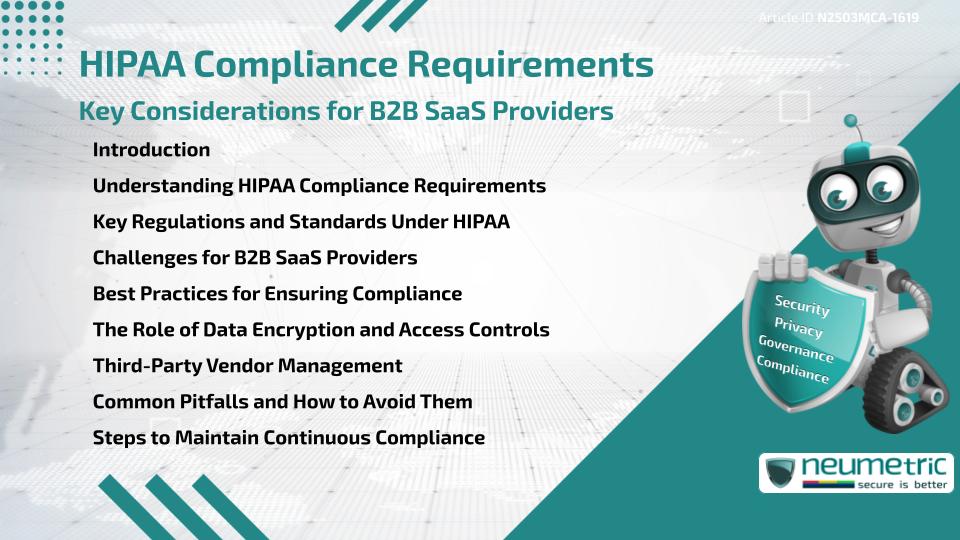Table of Contents
ToggleIntroduction
The Health Insurance Portability and Accountability Act [HIPAA] sets the standard for protecting sensitive health information. For B2B SaaS providers handling healthcare data, ensuring compliance with HIPAA compliance requirements is critical to avoiding legal risks and maintaining trust. This article explores key regulations, challenges, and best practices for compliance.
Understanding HIPAA Compliance Requirements
HIPAA compliance requirements dictate how protected health information [PHI] should be stored, processed, and transmitted. Organisations handling PHI must implement security controls, establish data privacy policies, and conduct regular risk assessments. Compliance applies not only to healthcare providers but also to their business associates, including SaaS vendors offering cloud-based healthcare solutions.
Key Regulations and Standards Under HIPAA
HIPAA consists of several rules that SaaS providers must follow:
- Privacy Rule: Defines how PHI should be accessed and disclosed.
- Security Rule: Establishes administrative, physical, and technical safeguards for data protection.
- Breach Notification Rule: Requires covered entities and business associates to notify affected parties of data breaches.
- Enforcement Rule: Outlines penalties for non-compliance.
Challenges for B2B SaaS Providers
SaaS providers face unique challenges in meeting HIPAA compliance requirements, including:
- Multi-tenant cloud environments where data separation is complex.
- Third-party integrations that increase security vulnerabilities.
- Evolving threat landscape requiring continuous monitoring and updates.
Best Practices for Ensuring Compliance
To achieve and maintain compliance, SaaS providers should:
- Implement role-based access controls.
- Encrypt PHI both in transit and at rest.
- Conduct regular security audits and risk assessments.
- Provide HIPAA training to employees.
The Role of Data Encryption and Access Controls
Encryption ensures PHI remains secure even in the event of a data breach. Access controls, including multi-factor authentication and strict user permissions, help prevent unauthorized access to sensitive health information.
Third-Party Vendor Management
HIPAA mandates that business associates and subcontractors comply with security and privacy requirements. SaaS providers must:
- Assess third-party vendor security policies.
- Establish Business Associate Agreements [BAAs].
- Monitor vendor compliance through audits.
Common Pitfalls and How to Avoid Them
Many SaaS providers fail compliance due to:
- Lack of proper documentation.
- Insufficient security controls.
- Failure to conduct regular audits.
Avoiding these pitfalls requires a proactive approach, continuous compliance monitoring, and employee awareness programs.
Steps to Maintain Continuous Compliance
HIPAA compliance is not a one-time effort. SaaS providers should:
- Implement automated compliance tracking tools.
- Keep software and security policies up to date.
- Respond promptly to regulatory changes and breach incidents.
Conclusion
HIPAA compliance requirements play a crucial role in ensuring the security and privacy of health data handled by B2B SaaS providers. By implementing strong security measures, managing third-party risks, and maintaining continuous compliance, SaaS providers can safeguard sensitive information and build trust with healthcare clients. Compliance is not just about avoiding penalties—it is about fostering a secure and reliable digital healthcare ecosystem.
Takeaways
- HIPAA compliance requirements are essential for B2B SaaS providers handling PHI.
- Encryption, access controls, and vendor management play a key role in compliance.
- Continuous compliance monitoring and security audits are necessary to mitigate risks.
FAQ
What are HIPAA compliance requirements for SaaS providers?
HIPAA compliance requirements include implementing security safeguards, encrypting PHI, and ensuring vendor compliance through Business Associate Agreements [BAAs].
How can SaaS providers ensure data security under HIPAA?
SaaS providers should use encryption, multi-factor authentication, and access control policies to protect sensitive health information.
What happens if a SaaS provider fails to comply with HIPAA?
Non-compliance can result in financial penalties, legal consequences, and loss of customer trust.
Do B2B SaaS providers need a Business Associate Agreement [BAA]?
Yes, any SaaS provider handling PHI on behalf of a healthcare entity must sign a BAA to define security obligations.
How often should a SaaS provider conduct HIPAA risk assessments?
Regular risk assessments should be conducted at least annually and whenever major system changes occur.
Is HIPAA compliance a one-time requirement?
No, HIPAA compliance is an ongoing process requiring continuous monitoring, security updates, and employee training.
Can SaaS providers store PHI in the cloud?
Yes, but they must ensure cloud storage meets HIPAA security and encryption requirements.
What are the penalties for violating HIPAA compliance requirements?
Penalties range from fines to criminal charges, depending on the severity of the violation.
How does HIPAA impact third-party vendors of SaaS providers?
SaaS providers must ensure third-party vendors comply with HIPAA security and privacy regulations through proper agreements and monitoring.
Need help?
Neumetric provides organisations the necessary help to achieve their Cybersecurity, Compliance, Governance, Privacy, Certifications & Pentesting goals.
Organisations & Businesses, specifically those which provide SaaS & AI Solutions, usually need a Cybersecurity Partner for meeting & maintaining the ongoing Security & Privacy needs & requirements of their Clients & Customers.
SOC 2, ISO 27001, ISO 42001, NIST, HIPAA, HECVAT, EU GDPR are some of the Frameworks that are served by Fusion – a centralised, automated, AI-enabled SaaS Solution created & managed by Neumetric.
Reach out to us!





